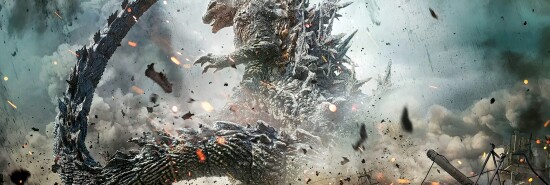
The Godzilla we deserve
Graham Hillard
Like all the best movies, Godzilla Minus One contains multitudes. A moving domestic melodrama, it is also a meditation on collective responsibility and individual guilt. A persuasive alternate history, it weighs, as well, the relative merits of love and honor. So effective is the film’s social commentary that the appearance of an iconic monster is almost, if not quite, superfluous. Might a sequel be arranged in which the protagonists quietly rebuild their lives with nary a prehistoric reptile in sight? Probably not. But I would pay to watch it.
The film tells the story of Koichi Shikishima, a kamikaze pilot in the waning days of World War II. As the narrative begins, our hero is setting down on Odo Island, Godzilla’s stomping ground in the original 1954 picture and a useful illustration of the new movie’s state of mind. In its first on-screen appearance, the fictional locale owed a debt to King Kong’s benighted Skull Island. Menaced by a giant lizard, the villagers performed an exorcism. The new movie’s Odo, by contrast, is run on strict military discipline. A way station for crippled suicide planes, it boasts not only modern weaponry but a garrison of soldiers trained to use it.
FERRARI: MORE TERRIBLE THAN JOYFUL
That Shikishima is temporarily among their number is a result of the film’s first crisis. Having feigned mechanical trouble, the young airman has landed his fighter and exempted himself from the war’s last sputters. Yes, the empire is defeated, but Shikishima is nonetheless guilty of cowardice, a state of affairs to which writer-director Takashi Yamazaki assigns believable weight. When, in the dead of night, a comparatively juvenile Godzilla attacks the outpost, Shikishima is too downcast to fight back. Strapped into his grounded aircraft, he freezes rather than firing his guns. By the time the monster finishes his rampage, nearly everyone on the island is dead.
Because Godzilla Minus One is a morally serious film, it makes no effort to excuse its protagonist’s failings. Back in Tokyo at the war’s conclusion, a shattered Shikishima picks through his burned-out ward, haunted by his behavior on the front. A local matron taunts him for having lived, and, knowing what we do, the audience is primed to agree. It is only when Shikishima finds a baby unattended in a marketplace that he and we begin to note the possibility of redemption. Soon, joined by a beautiful young woman named Noriko, the former soldier sets up a home of sorts. Perhaps the two survivors can raise the baby together and find some meaning in the chaos wrought by war.
As narratives from the Iliad to the Game of Thrones novels attest, this tension between the martial and the domestic can make for a damn fine story. Relieved that the fighting is over, Noriko wants nothing more than to marry Shikishima and rear their adopted child. Shikishima, meanwhile, has lost both his self-respect and sense of virtue. Until he gets them back, he will be no good for anyone. A less confident movie might have eased its protagonist’s transition to peacetime — or, worse, dismissed his ideals as “toxic masculinity.” Yamazaki’s film has something better in mind. Having behaved contemptibly, Shikishima really does owe a debt. It is in the battle against Godzilla that the young man will have a chance to wipe his slate clean, thus fitting himself to receive his family’s love.
I will reveal little about how that battle unfolds. Suffice it to say that geopolitics play their part, as do the resourcefulness and resilience of the postwar Japanese. Importantly, the film maintains the illusion throughout that we are in a real and not fantastical world. If Godzilla is a projection of thermonuclear anxieties, so must his defeat proceed from the tenacity, the daring — the character — of his victims.
CLICK HERE TO READ MORE FROM THE WASHINGTON EXAMINER
We should, by now, be used to creature features that bear philosophy in their talons. Jurassic Park (1993) endures in part because of its winking knowingness where the limits of expertise are concerned. Peter Jackson’s King Kong (2005) is a startlingly literate study of the human capacity for self-destructive longing. The 2016 kaiju spectacle Shin Godzilla has as much to say about bureaucratic mismanagement as do the works of Franz Kafka. That the latest Godzilla flick offers its own saga of ideas shouldn’t surprise us. How else is a monster movie to overcome the weaknesses inherent to its form?
In small ways, those weaknesses are in play here. For one thing, Godzilla Minus One’s title lizard looks just as ridiculous as most pure CGI creations. (To be fair, the film’s budget was reportedly less than $15 million.) For another, the picture hits certain predictable beats despite its ideological heft. Yet these are small quibbles. So compelling is the production’s credo that one is both willing and eager to overlook its warts. I left the theater convinced I had seen not just the best monster movie in recent memory but the best film of the year. If Barbie and Oppenheimer want to escape with their lives, they had better start running.
Graham Hillard is a Washington Examiner magazine contributing writer and editor at the James G. Martin Center for Academic Renewal.
